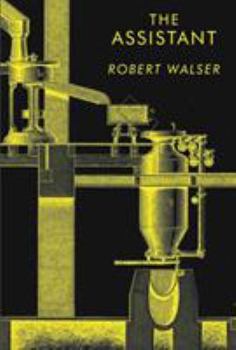The Assistant
Select Format
Select Condition 
Book Overview
Robert Walser is an overwhelmingly original author with many ardent fans: J.M. Coetzee ("dazzling"), Guy Davenport ("a very special kind of whimsical-serious-deep writer"), and Hermann Hesse ("If he had a hundred thousand readers, the world would be a better place"). Charged with compassion, and an utterly unique radiance of vision, Walser is as Susan Sontag exclaimed "a truly wonderful, heart-breaking writer."
The Assistant is his breathtaking...
Format:Paperback
Language:English
ISBN:0811215903
ISBN13:9780811215909
Release Date:July 2007
Publisher:New Directions Publishing Corporation
Length:320 Pages
Weight:2.40 lbs.
Dimensions:0.8" x 5.2" x 6.9"
Customer Reviews
2 ratings
An Antidote for Notes from Underground
Published by Thriftbooks.com User , 16 years ago
Hermann Hesse famously remarked "If (Walser) had a hundred thousand readers, the world would be a better place." The Assistant does more to explain that opinion than any of Walser's other books. He was always trying to give a voice to the humble, the self-effacing, the marginalized. But as he aged he came to focus more and more on vignettes, and these seem to have gotten odder and odder. In this early work, he gives a full-length portrait of people on the edge, of society and of financial ruin. I approached the novel with some uneasiness, wondering whether the delicate, fragile magic his briefer pieces demonstrate could sustain such a long (for him) work (295 pages). I'm happy to report that it does, and beautifully. There are short sections, like the hero's recollection of a childhood outing, that could very well have stood alone but are woven into the texture of the narrative flawlessly. The outing he recalls was a perfectly beautiful and happy experience, and some fleeting references make it clear that this was far from normal for his home life. It's a delicate moment that brings the hero's life into sharp, individual relief, but also makes clear that his life is part of the same heartbreaking continuum as that of the doomed family he's temporarily become a part of. I recently tried to re-read Dostoyevsky's Notes from Underground (Notes from a Hole in the Floor, really; excuse the picked nit) and found I no longer have a taste for it. Dostoyevsky's satire is fiercely focused on the vile and pathological. Walser's hero is a far sadder figure, a nobody with drastically limited prospects. He not only knows that and has accepted it, he embraces it. He has his occasional bursts of meanness or ill-temper, but so do we all. Jakob von Gunten is a shorter book, and perhaps more representative of Walser's irreduceable and irreplaceable oddness. But The Assistant is the book I'd recommend someone new to Walser to start with.
"Curse those bacon-and-sausage eaters!"
Published by Thriftbooks.com User , 16 years ago
Joseph Marti, a young man between jobs, gains the position of Assistant at the villa and workplace of Carl Tobler, a struggling and possibly-cockamamie inventor. Despite Tobler's unpromising professional struggle and his lack of investors, he puts no brakes on his expensive joie de vivre. Joseph ends up smoking cheroots, sending away creditors, taking hilarious dictations, alternately entertaining and vexing Tobler's wife, and enjoying the Tobler's bountiful lunches and dinners: "Sit down. Wherever you like, it doesn't matter. And eat until you've had your fill. Here's the bread. Cut yourself as much as you'd like. There's no need to hold back. Go ahead and pour yourself several cups--there's plenty of coffee. And here is butter. The butter, as you see, is here to be eaten. And here's some jam, should you happen to be a jam-lover. Would you like some fried potatoes as well?" Hospitality is practically stuffed in Joseph's face, though he refuses to believe that he ever earns it. A good stuffing of hospitality at the dinner table is a recurring theme in Walser's work. The Tobler family slides into dispossession. Walser captures the impendingness of the situation by describing the characters and their interactions over the course of about a year. A letter from Tobler's mother coldly punctuates the end of the story with a vicious moral, though that isn't the end of the book. What shines to me isn't the plot (does anyone read for plot?) but the details of Joseph's inner turmoil, its occasional outlets, plus the THEATRICAL MOOD SWINGS OF TOBLER, and Walser's unbelievably fresh and insightful descriptions of simple events like going for a swim in a lake or waking up in bed on a Sunday morning. His pre-kafkaesque description of a credit auditor's lurking around the villa is a classic passage here, too. (It rivals or surpasses the supernatural domestic fantasy of Marquez's Solitude and the bureacratic goons of Kafka, and pre-dates both of them). The sudden appearance of a military prison episode forms one of Walser's best and only ensemble scenes. ("Slap the Ham") Joseph is the usual Walserian hero: he's timid, he's doubtful of his own importance and abilities, he privately rags on himself out loud in high-style, yet he will burst out with an impudent speech to his masters. I still don't fully understand whether these impassioned officially-worded outbursts are a piece of comedy, a projection of Walser's mental state, or have some basis in the reality of actual conversations in Switzerland/Germany in the 1900's. If you're new to Walser I recommend Jakob Von Gunten, his most accessible and probably famous work, which is made so breezy by its young schoolboy narrator. Everyone should start there. If you're not new to Walser then you'll obviously want this book, there's nothing to say so I've done you no favors, unless you are a stick in the mud. Did I forget to say this is an extremely enjoyable book?






